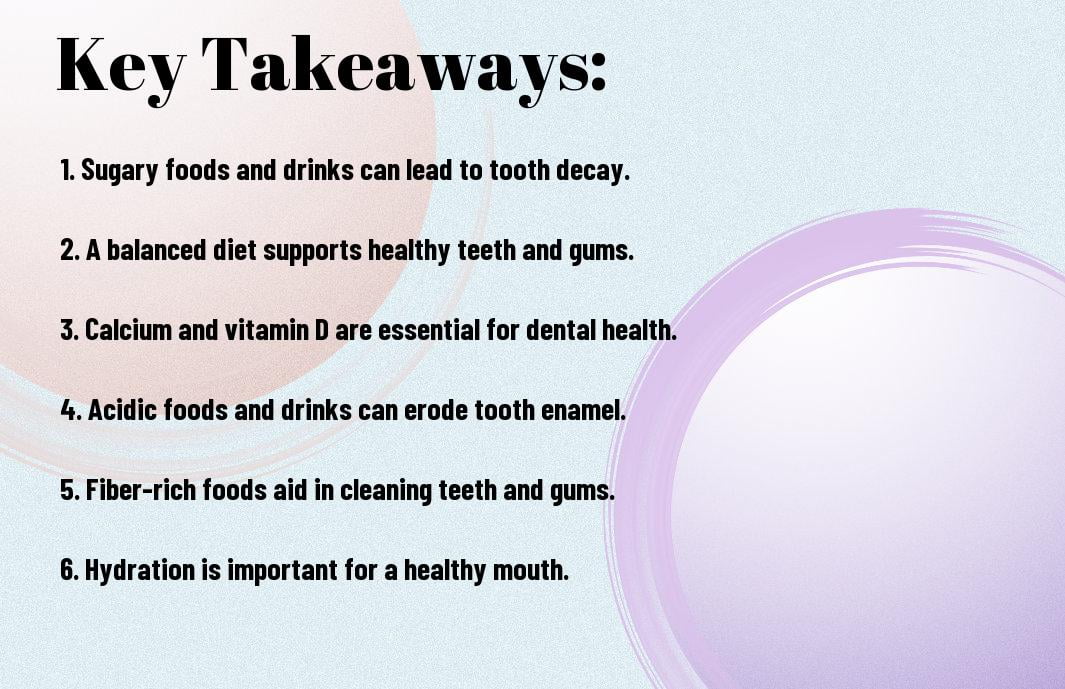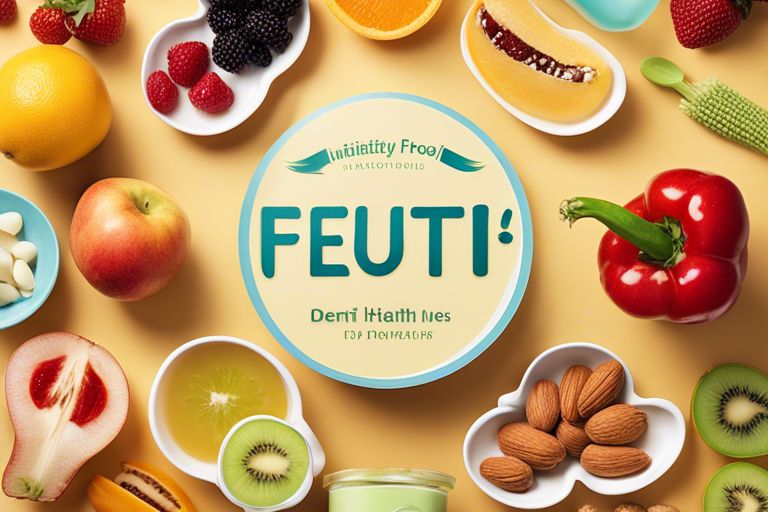Did you know that your diet and nutrition play a crucial role in maintaining good oral health? The foods and beverages you consume can have significant impacts on your dental health, affecting everything from the strength of your teeth to the health of your gums. To understand the importance of diet and nutrition on dental health, it’s essential to consider the link between your eating habits and oral hygiene. A study published on Good Oral Health and Diet – PMC found that consuming sugary and acidic foods and drinks can lead to tooth decay, while a diet rich in nutrient-dense foods can help to prevent dental issues and promote overall oral health. By making conscious choices about what you eat and drink, you can positively impact your dental health for years to come.
Key Takeaways:
- Diet directly affects dental health: The foods and drinks we consume have a significant impact on the health of our teeth and gums.
- Sugar and acids are major culprits: High consumption of sugary and acidic foods and beverages can lead to tooth decay and erosion.
- Nutrient-rich foods are essential: A balanced diet rich in calcium, phosphorus, and vitamin C can help maintain strong teeth and promote gum health.
- Proper hydration is important: Drinking plenty of water helps wash away food debris and acidic substances, reducing the risk of tooth decay.
- Regular dental check-ups are crucial: While diet and nutrition play a key role in dental health, regular visits to the dentist for cleanings and check-ups are essential for maintaining a healthy smile.
Nutritional Factors Affecting Dental Health
Now, let’s delve deeper into the nutritional factors that play a crucial role in maintaining your dental health. Your diet has a significant impact on the health of your teeth and gums. Here are the key nutritional factors that can affect your dental health:
- Calcium: This mineral is essential for strengthening your teeth and bones.
- Vitamin D: It helps your body absorb calcium and promotes overall oral health.
- Vitamin C: This vitamin is important for healthy gums and can help prevent gum disease.
- Phosphorus: It works with calcium to protect and strengthen your tooth enamel.
- Water: Staying hydrated is crucial for saliva production, which helps wash away food particles and bacteria.
The foods you consume directly impact the health of your teeth and gums. The nutrients you get from your diet play a significant role in maintaining good oral health. The foods you choose can either support or compromise the health of your teeth and gums.
Essential Nutrients for Strong Teeth and Gums
Ensuring that you get an adequate intake of calcium, vitamin D, and vitamin C is essential for maintaining strong teeth and healthy gums. These nutrients contribute to the strength of your tooth enamel, help prevent tooth decay, and support gum health. Including a variety of dairy products, leafy greens, citrus fruits, and other nutrient-rich foods in your diet can help you maintain optimal dental health.
Dietary Pitfalls and Oral Health Risks
On the other hand, consuming a diet high in sugar, acidic foods, and processed snacks can significantly increase your risk of developing tooth decay and gum disease. These dietary pitfalls can lead to enamel erosion, cavities, and other oral health issues. It’s essential to minimize your intake of sugary and acidic foods to maintain the health of your teeth and gums. Additionally, frequent snacking can also increase the risk of tooth decay, as it exposes your teeth to prolonged periods of acid attacks.
The Role of Dietary Choices in Preventive Dentistry
To maintain good dental health, your dietary choices play a crucial role. What you eat and drink can have a significant impact on the integrity of your teeth and gums. By making informed dietary choices, you can effectively prevent dental issues and maintain optimal oral health.
Foods That Enhance Oral Health
Consuming foods that enhance oral health is essential for preventing dental problems. Foods rich in calcium, such as dairy products, leafy greens, and almonds, help build and maintain strong teeth and bones. Vitamin C-rich foods, including citrus fruits and strawberries, can help boost gum health and prevent gum disease. Additionally, crunchy fruits and vegetables, like apples and carrots, can help clean your teeth and stimulate saliva production, which aids in removing food particles and neutralizing acids in the mouth.
Foods and Habits That Harm Dental Integrity
On the other hand, there are certain foods and habits that can harm your dental integrity and lead to oral health issues. Consuming sugary and starchy foods and beverages can contribute to tooth decay and cavities by promoting the growth of harmful bacteria in your mouth. Additionally, acidic foods and drinks, such as sodas, citrus fruits, and vinegar-based dressings, can erode tooth enamel and lead to tooth sensitivity and decay. Furthermore, habits like smoking and excessive alcohol consumption can also have detrimental effects on your dental health, including an increased risk of gum disease and oral cancer.
The Interplay Between Oral Health and Systemic Conditions
Keep in mind that your overall health is closely connected to your oral health. The mouth is the gateway to the body, and the health of your teeth, gums, and oral cavity can have a significant impact on your systemic conditions. Understanding this interplay is crucial for maintaining your overall well-being.
Understanding the Oral-Systemic Health Link
When it comes to your oral health, it’s important to understand that the health of your mouth can affect the rest of your body. Poor oral health has been linked to several systemic conditions, including cardiovascular diseases, diabetes, and respiratory infections. The presence of gum disease, for example, can lead to inflammation and increase the risk of developing conditions like heart disease and stroke. Additionally, oral infections can worsen existing systemic conditions, making it essential to prioritize your oral health as part of your overall well-being.
Diet-Related Systemic Diseases and Oral Health
Your diet plays a crucial role in both your systemic health and your oral health. Poor nutrition can lead to systemic diseases such as diabetes, obesity, and cardiovascular diseases, all of which can have negative effects on your oral health. For example, diabetes can increase your risk of developing gum disease, while excessive sugar consumption can contribute to tooth decay. On the other hand, a well-balanced diet rich in essential nutrients can promote both systemic and oral health, helping to keep your teeth and gums strong and healthy.
Practical Advice for Diet-Based Dental Care
Not only can the foods you eat affect your overall health, but they also play a significant role in your dental health. By making smart choices about what you eat, you can significantly improve the health of your teeth and gums. Here are some practical tips to help you care for your dental health through diet.
Daily Nutritional Recommendations for Optimal Dental Health
When it comes to maintaining optimal dental health through diet, it’s important to ensure you are getting enough calcium and vitamin D. These nutrients are essential for strong teeth and bones. You can find them in dairy products like milk, cheese, and yogurt, as well as in leafy greens and fortified foods. Additionally, vitamin C is important for healthy gums, so make sure you include plenty of fruits and vegetables like oranges, strawberries, and bell peppers in your diet.
Strategies for Maintaining Dental Health Through Diet
One of the most important strategies for maintaining dental health through diet is to limit your consumption of sugary and starchy foods. These types of foods can lead to tooth decay and gum disease if consumed in excess. Instead, opt for crunchy fruits and vegetables like apples and carrots, which can help clean your teeth as you eat them. Additionally, drinking plenty of water and chewing sugar-free gum after meals can help stimulate saliva production, which is essential for neutralizing acids and protecting your teeth.
The Impact Of Diet And Nutrition On Dental Health
The impact of diet and nutrition on your dental health cannot be overstated. What you eat and drink directly affects the health of your teeth and gums. A diet high in sugar and acidic foods can lead to tooth decay and erosion, while a diet rich in calcium, vitamin D, and antioxidants can help strengthen and protect your teeth. By making informed choices about your diet and focusing on nutrient-dense foods, you can significantly improve your oral health and overall well-being. Remember to also practice good oral hygiene habits and visit your dentist regularly for check-ups and cleanings to maintain a healthy smile.
FAQ
Q: How does diet and nutrition impact dental health?
A: Diet and nutrition play a crucial role in maintaining optimal dental health. Consuming a diet high in sugary and acidic foods can lead to tooth decay and erosion, while a balanced diet rich in vitamins and minerals can help support healthy teeth and gums.
Q: What are some foods that can negatively impact dental health?
A: Foods high in sugar, such as candy, soda, and sweets, can contribute to the formation of plaque and tooth decay. Additionally, acidic foods and drinks like citrus fruits and carbonated beverages can erode tooth enamel, leading to sensitivity and cavities.
Q: How can I improve my dental health through diet and nutrition?
A: To support good dental health, focus on consuming a diet that includes plenty of fresh fruits and vegetables, lean proteins, and dairy products. Avoiding excessive sugar and acid intake, and staying hydrated with water, can also help maintain a healthy mouth and reduce the risk of dental issues.







